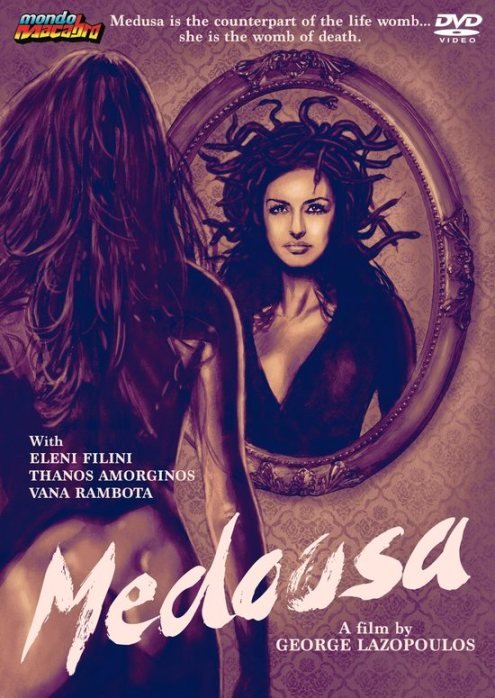MEDOUSA: Horror And Crime, The Hellenic Way
The most interesting thing about watching horror films from foreign countries is seeing how filmmakers draw upon indigenous folk tales and myths to add a region-specific touch to familiar genre archetypes. Medousa is an interesting example of this process in action, with Greek writer/director George Lazapoulos weaving the legend of Medusa into a strange tale that mixes family drama, crime story and supernatural horror. It's also worth nothing that the director doubles down on the unique nature of his story with a distinctly artsy approach to genre concerns.Medousa has an intriguing story structure in which a variety of seemingly disparate story threads gradually make their way to a finale that ties them all together. An extended prologue sets up the childhood of Perseas (Thanos Amorginos), a troubled boy whose mother marries into a family with a reclusive and eccentric sister.  Years later, he has a become a club owner who moonlights as a thief. He and his crew go on a mission to rob a home that happens to be owned by the eccentric sister from years gone by. Meanwhile, the local police are investigating bizarre incidents where stone replicas of disappeared men suddenly pop up all over town...The result is truly its own animal. Medousa takes its time but feels hypnotic instead of dull. Lazapoulos displays a minimalist style and a deadpan-quirky sense of humor as he lays out the threads of the story, getting the audience to lean forward as the mystery is teased out and the supernatural elements slowly rise to the fore. It all pays off nicely in a final act that has a modern-day mythological battle, a bit of surprise nudity and a fun twist ending. To his credit, Lazapoulos pays off all the story's elements and never overplays the mythological elements.The director's filmmaking style is similar to his scripting style, going for a low-key, minimalist approach to visuals and performance. It's a smart choice because it makes the loopier elements of the story stronger by handling them in a matter-of-fact style. Performances are pretty solid for an amateur cast, with Amorginos making an interesting performance as the brooding lead character. It's also interesting to note the film has indie movie-style rock score that gives the final moments a bit of spaghetti western atmosphere.In short, Medousa might be a little too off-the-beaten-path for the blood-and-thunder horror crowd but more adventurous viewers will find its subtle and unusual approach rewarding.DVD Notes: Mondo Macabro rescued this title from obscurity for a new DVD release. The anamorphic transfer looks solid, reflecting the original 1.66:1 ratio and having a nice level of detail for an SD presentation. As for extras, there is a making-of piece (34:42) that is basically a sit-down with filmmaker George Lazapoulos. He discusses how he got into filmmaking, how he came up with the idea, the lengthy process of putting the film together and his love of Dario Argento's work. There is also a chat with Amorginos (9:54), who looks back with bemused humor at how he learned acting on-the-job working on Medousa. A short, artsy trailer and the reliably colorful Mondo Macabro preview reel round things out.
Years later, he has a become a club owner who moonlights as a thief. He and his crew go on a mission to rob a home that happens to be owned by the eccentric sister from years gone by. Meanwhile, the local police are investigating bizarre incidents where stone replicas of disappeared men suddenly pop up all over town...The result is truly its own animal. Medousa takes its time but feels hypnotic instead of dull. Lazapoulos displays a minimalist style and a deadpan-quirky sense of humor as he lays out the threads of the story, getting the audience to lean forward as the mystery is teased out and the supernatural elements slowly rise to the fore. It all pays off nicely in a final act that has a modern-day mythological battle, a bit of surprise nudity and a fun twist ending. To his credit, Lazapoulos pays off all the story's elements and never overplays the mythological elements.The director's filmmaking style is similar to his scripting style, going for a low-key, minimalist approach to visuals and performance. It's a smart choice because it makes the loopier elements of the story stronger by handling them in a matter-of-fact style. Performances are pretty solid for an amateur cast, with Amorginos making an interesting performance as the brooding lead character. It's also interesting to note the film has indie movie-style rock score that gives the final moments a bit of spaghetti western atmosphere.In short, Medousa might be a little too off-the-beaten-path for the blood-and-thunder horror crowd but more adventurous viewers will find its subtle and unusual approach rewarding.DVD Notes: Mondo Macabro rescued this title from obscurity for a new DVD release. The anamorphic transfer looks solid, reflecting the original 1.66:1 ratio and having a nice level of detail for an SD presentation. As for extras, there is a making-of piece (34:42) that is basically a sit-down with filmmaker George Lazapoulos. He discusses how he got into filmmaking, how he came up with the idea, the lengthy process of putting the film together and his love of Dario Argento's work. There is also a chat with Amorginos (9:54), who looks back with bemused humor at how he learned acting on-the-job working on Medousa. A short, artsy trailer and the reliably colorful Mondo Macabro preview reel round things out.

